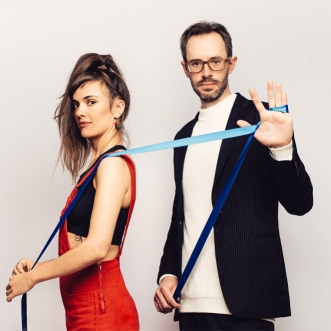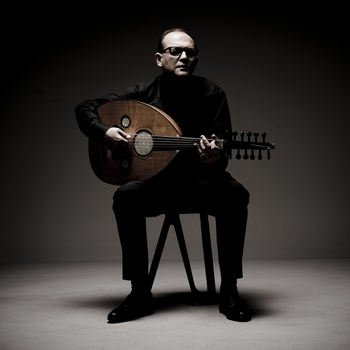jazz
Camille Bertault David Helbock

Présentation du spectacle
Nouvel album " Playground " mai 2022 chez ACT
Ecoute ICI
Tournée duo piano / voix
5 étoiles dans le prestigieux magazine Downbeat !
Camille Bertault et David Helbock sont les nouvelles étoiles montantes de la scène jazz européenne.
Elle, française, chanteuse au tempérament, à la voix et à l’humour ravageurs.
Lui, autrichien, magicien du piano auréolé de prix internationaux.
Les deux artistes se rejoignent sur scène dans un duo mêlant jazz mais aussi pop, classique et compositions originales.
David Helbock est également en tournée :
- Quintet : Austrian Syndicate, nouvel album 25 aout 2023 chez ACT
EN ECOUTE ICI
David Helbock : clavier
Peter Madsen : piano
Raphael Preuschl : basse
Herbert Pirker : batterie
Claudio Spieler : percussions
Austrian Syndicate, la référence est claire au Zawinul Syndicate, de Joe Zawinul, le plus connu et le plus influent des jazzmen autrichiens, pionner dans l’utilisation des claviers.
Pourtant, ce nouveau projet de David Helbock est bien plus qu’un simple hommage à son compatriote. C’est un retour aux sources vers le jazz fusion. C’est aussi un nouveau virage artistique pour le pianiste avec une ouverture vers des nouveaux horizons, un projet qui lui tenait à cœur.
Avec la meilleure section rythmique autrichienne : Raphael Preuschl au ukulele basse, Herbert Pirker à la batterie et Claudio Spieler aux percussions et le pianiste, David Helbock laisse la place au piano à Peter Madsen et invite des stars internationales de premier choix : Maria João, Fred Wesley, Dhafer Youssef, Alex Acuña et Lakecia Benjamin
Le groupe a définitivement trouvé sa façon de faire partager son énergie, sa diversité et surtout son plaisir de jouer. Helbock a le don de faire sortir de ses claviers toutes sortes de sons excentriques et de les utiliser pour créer de véritables tempêtes musicales !
L’Austrian Syndicate de David Helbock est un voyage vers un jazz fusion sans limite, aux grooves irrésistibles. L’un des meilleurs albums feel good au plutôt feel great de l’année !
- Trio : David Helbock´s Random/Control
David Helbock : piano,
Johannes Bär : trompette, tuba, beatbox, didgeridoo, percussion
Andreas Broger : sax, clarinette, flute, percussion
Album chez ACT mai 2018
- Piano solo
Album chez ACT aout 2019
Présentation de l'album Playground
D’un côté, l’étoile montante du jazz vocal à la française, de l’autre, l’un des pianistes les plus passionnants de la scène européenne. À eux deux, Camille Bertault et l’Autrichien David Helbock forment un tandem de choc, ouvert à toutes les aventures musicales. Et si les deux trentenaires semblent de prime abord dotés de caractères diamétralement opposés – elle, pétillante et pleine d’humour, lui, plus serein et réfléchi –, ils ne s’en retrouvent pas moins sur l’essentiel : une même envie de raconter des histoires en musique, en faisant fi des conventions et des barrières sylistiques. Premier effort discographique du duo, “Playground” s’impose d’emblée par sa fantaisie débridée et son inventivité sans limites.
Tout commence par une rencontre en 2019, à l’occasion des Schlossfestspiele de Ludwigsburg. Suivant une règle du jeu propre à ce festival, David Helbock est invité à se choisir un(e) partenaire avec qui il n’a encore jamais joué. Il porte son choix sur Camille Bertault, qui à son tour convie Médéric Collignon à se joindre à eux, donnant ainsi lieu à un premier concert en trio. Le courant passe immédiatement entre la chanteuse et le pianiste, qui se découvrent de nombreux points communs : tous deux viennent du classique (avant de trouver sa voix, Camille a d’abord étudié le piano au conservatoire jusqu’à ses vingt ans), mais se passionnent pour un large spectre de musiques, puisant leurs références et leurs modèles dans les genres les plus divers. Un héritage qu’ils ont à cœur de faire vivre au présent, à la lumière de leurs personnalités propres – et quelles personnalités !
Très vite, l’idée du duo s’impose donc comme une évidence, mais la Covid ne va pas leur simplifier la tâche : ce n’est qu’à l’été 2021 qu’ils finissent par se retrouver enfin sur la scène de l’INNtöne Jazzfestival en Autriche, pour un concert-événement qui jettera les premières bases de l’album. « Avant le concert de Ludwigsburg, nous avions déjà échangé par e-mail sur nos envies, les morceaux que nous aimerions jouer », se souvient Camille Bertault. « Nous adorons tous les deux Egberto Gismonti, Hermeto Pascoal, Björk et Thelonious Monk, et nous étions aussi d’accord pour intégrer une pièce d’un compositeur classique », complète David Helbock.
Ainsi se dégage les grands axes de leur répertoire : l’hommage Para Hermeto, signé Helbock, Frevo de Gismonti, New World de Björk, Ask Me Know de Monk, sans oublier l’Étude op. 2 no 1 en do dièse mineur de Scriabine. Autant d’occasions pour le duo de déployer toute la richesse de sa palette : si Camille Bertault s’illustre plus d’une fois par des vocalises acrobatiques, d’une virtuosité « instrumentale » stupéfiante, elle se révèle aussi bien capable de la plus grande tendresse, et ne dédaigne pas d’écrire ses propres textes, incarnés avec une présence hors du commun qui vient nous rappeler qu’elle a également suivi des études d’art dramatique. De son côté, David Helbock se plaît à explorer sans relâche toutes les potentialités de son instrument, n’hésitant pas à jouer des cordes à l’intérieur du piano, à percuter la caisse de résonance ou à varier les textures grâce à des effets électroniques. « Pour la première fois, j’ai également beaucoup travaillé avec des boucles générées en temps réel. », complète l’intéressé.
D’où un accompagnement à la dimension quasi orchestrale, écrin de choix pour une voix pas comme les autres. « Camille a souvent une conception très claire de la façon dont tel ou tel morceau doit sonner, et c’est vrai un plaisir de peaufiner cette vision ensemble. » C’est peut-être encore dans les sept compositions originales écrites spécialement pour l’occasion (quatre du pianiste et trois de la chanteuse) que cette complicité s’exprime le mieux, de la veine drolatique de Lonely Supamen au climat mystérieux de Das Fabelwesen, en passant par le groove funky d’Aide-moi et la mélancolie éthérée de Bizarre.
Véritable kaléidoscope de couleurs et d’émotions, “Playground” nous mène ainsi de surprise en surprise, porté par une technique vocale et pianistique qui, pour impressionnante qu’elle soit, ne prend jamais le pas sur l’essentiel. « Avec ce duo, il ne s’agit pas de faire étalage de virtuosité, mais avant tout d’exprimer la vérité de l’instant », souligne Camille Bertault. La preuve en douze morceaux, et autant d’histoires musicales à savourer.






















